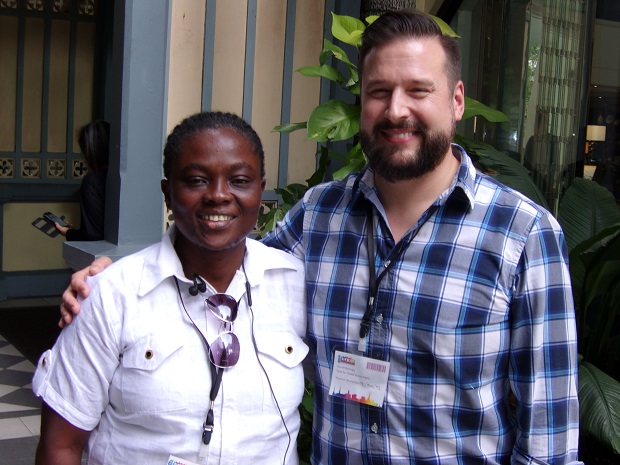This article was published more than 8 years ago.

As an increasing number of governments across the globe foster nationalism, xenophobia and intolerance to consolidate power and advance their interests, the work of on-the-ground human rights advocates is more important than ever. And for many vulnerable communities, basic dignities and rights hinge upon the success of these advocates.
Last November, I had the opportunity to meet and consult with some of these individuals. Over several days, I spent time with lesbian, gay, bisexual, transgender and intersex (LGBTI) activists from around the world at the International Lesbian and Gay Association (ILGA) meeting in Bangkok. These courageous rights defenders are holding the line and promoting dignity and inclusion in their communities and societies.
But the individuals I met face enormous challenges and risks—some with consequences that could mean life or death. ILGA is the only convening I attend whose program prominently pays tribute to members of the community who lost their lives since the last gathering. These tragedies, whether brought by societal violence and even targeted killings, or by lack of access to adequate healthcare, remind us all what is at stake. Yet even in the face of real, imminent danger, the movement has not only persevered, but it has grown larger, broader, and more diverse than at any time in its history.
This strength is evidenced by continued victories on the front lines. In just one example, rumors that LGBTI people were responsible for Liberia’s Ebola virus outbreak triggered waves of hate crimes. In response, activists demanded that police fully investigate reports of violence and fulfill their duty to protect all Liberian citizens, regardless of sexual orientation or gender identity.
The hard work and dedication of the activists paid off. Following sustained pressure and engagement, the police established a hotline for LGBTI persons to call in case of attack and have appointed a liaison within the force to provide sensitivity training to officers. This development is particularly remarkable, as police had rarely investigated previous reports of violence and sometimes even arrested the victim.
In addition to unthinkable violence, LGBTI people around the world often face discrimination when it comes to accessing employment, housing and health care, not to mention rejection from their families and religious communities. Moreover, those that seek to defend their security and rights regularly confront brutal and repressive backlash against the gains they’ve made. In many countries, these hostile reactions have taken the form of new legal restrictions on the ability of LGBTI organizations and activists to operate.
In Russia, for example, a law prohibiting so-called pro-gay propaganda has effectively criminalized human rights work on behalf of LGBTI people. At the same time, smear campaigns targeting activists portray them as foreign agents working against the interests of their own societies. This kind of legislation and rhetoric emboldens bigotry, often leading to an increase in violence and harassment. LGBTI defenders also report an alarming spike in online harassment and death threats, which they fear could translate into actual physical attacks and even murder.
This unprecedented and widening crackdown on human rights work extends beyond just LGBTI activism. In some cases, restrictions on LGBTI groups like the anti-propaganda laws may portend a wider assault on other independent citizens’ groups as governments seek to silence those with the power to hold them accountable. Indeed, according to a September 2016 report by the International Center for Not-for-Profit Law (ICNL), since the beginning of 2015, states have adopted sixty-four restrictive laws, regulations, and other initiatives.
Frustratingly, these restrictions are as varied as they are plentiful. Many governments have moved to starve groups of funding by placing new legal constraints on cross-border philanthropy. They seek to undermine the independence of activists by interfering in and exerting control over organizations’ finances and operations. Peaceful protests have been banned, independent media outlets shut down, and defamation laws imposed to deter activists from speaking out.
As we discussed at ILGA, those of us working to move funding into the hands of frontline activists must work together to overcome these barriers and ensure needed resources continue to flow to those putting their lives and livelihoods on the line for justice. Local and regional funds, such as UHAI, the East African Sexual Health and Rights Initiative, play a critical role as they are close to the ground, locally-led, and often give activists a say in which groups receive funding. This confers a high level of legitimacy and credibility among the communities they serve.
International grant-makers like the Fund for Global Human Rights have wide reach to resource and convene activists from different countries and contexts to learn from each other and join forces. Further, international funders can support sensitive work that directly challenges the government and other structures of power without fear of being targeted or shut down.
Government aid can also provide significant levels of funding; however, particularly on the issue of LGBTI rights, activists foresee a pull-back or complete reversal among several governments.Finally, as threats to activism grow, so too does the role individual donors can play in filling the gaps in support for rights defenders.
The ongoing crackdown on human rights activism can be partially attributed to the success and effectiveness of the global human rights movement, as current power-holders move to reverse historic gains. It’s up to us to ensure that landmark victories are not repealed and that human dignity does not become a casualty of these regressive tactics.
On this, we could take a page out of the LGBTI rights movement’s book. Time and again, activists for LGBTI rights have shown themselves to be remarkably resilient, weathering attacks and backlash because the stakes are higher without this fight. From this week, I find hope and inspiration in their success and unfailing commitment—and I am more dedicated than ever to support them in this struggle.